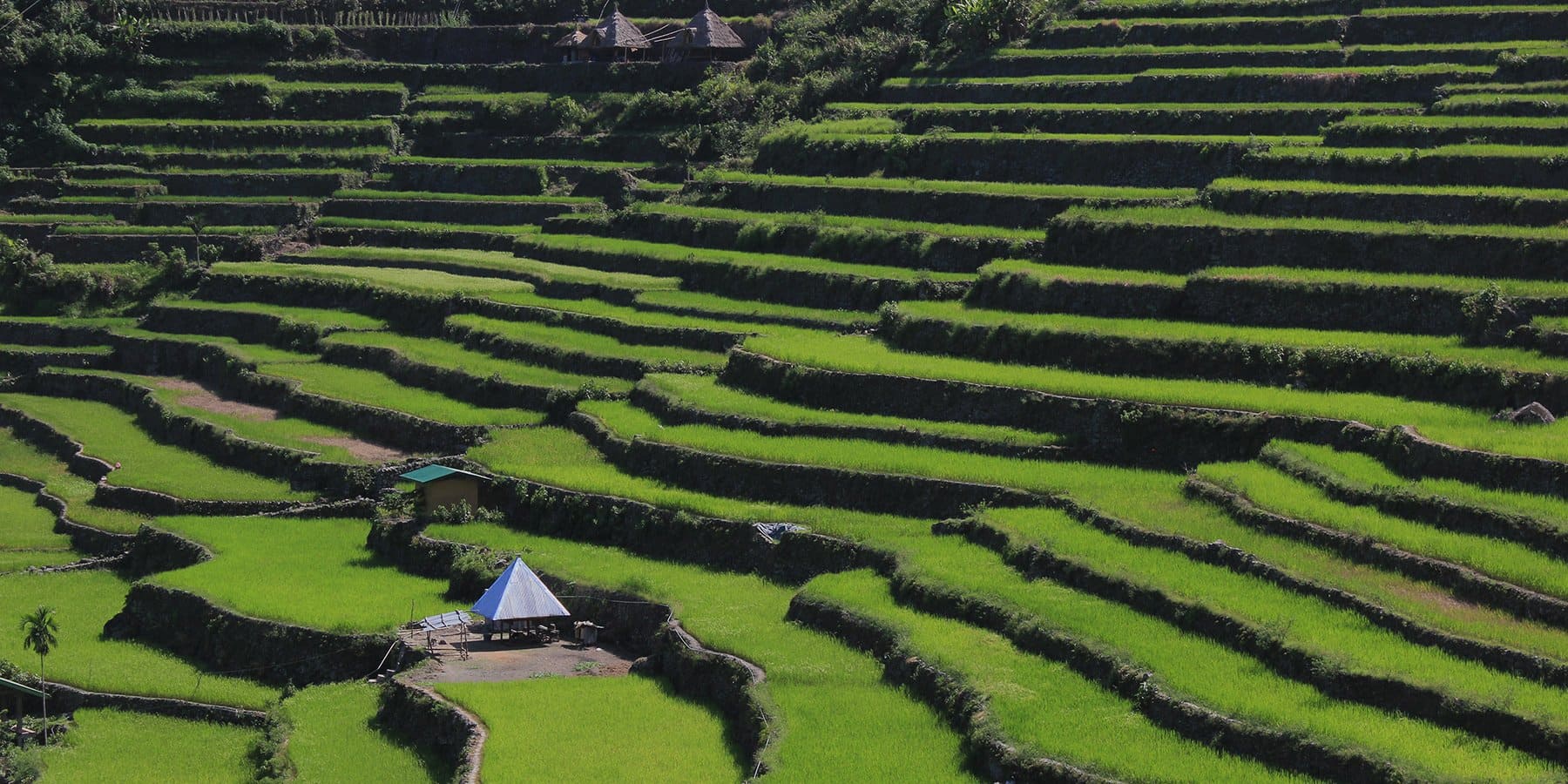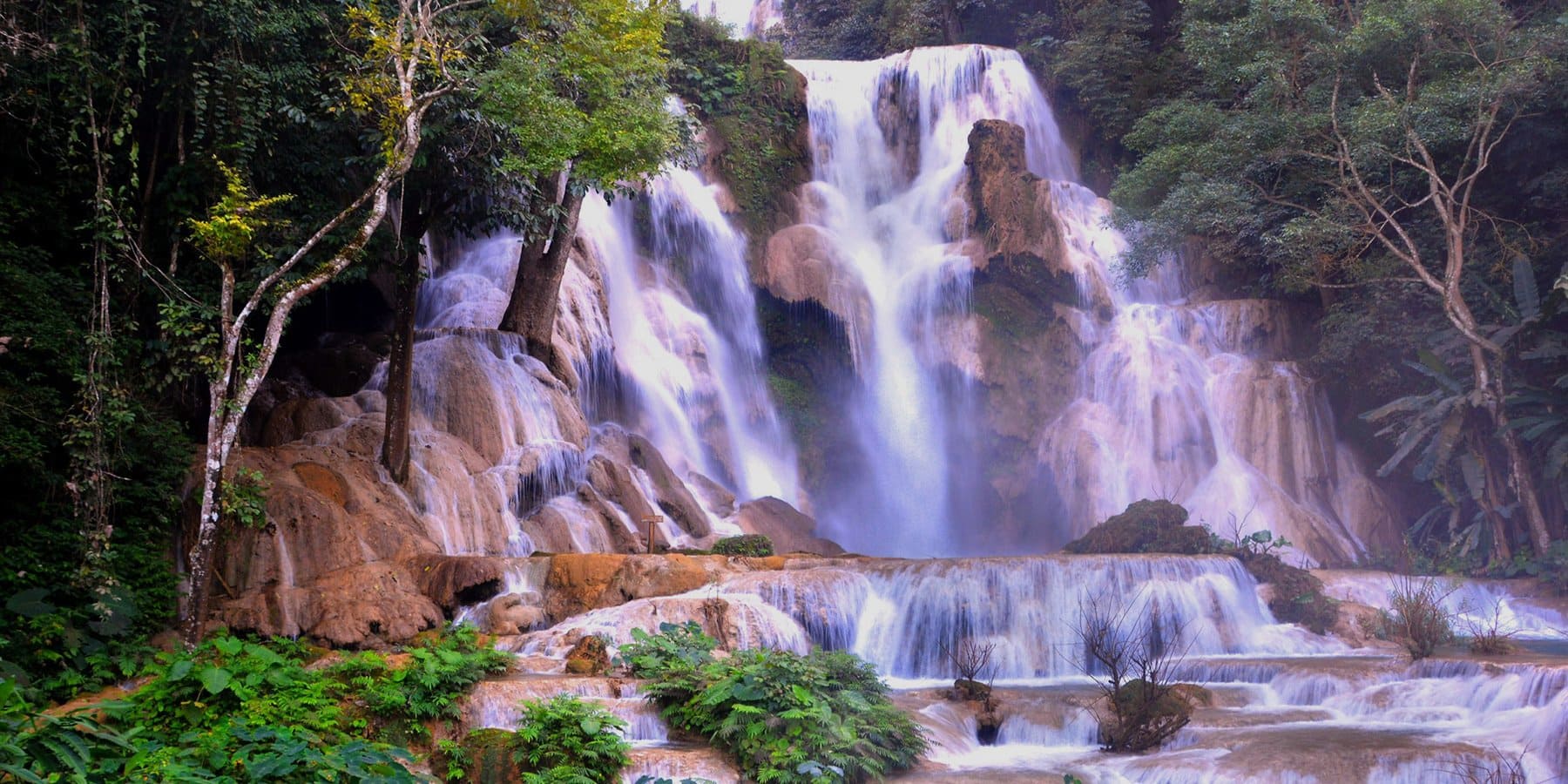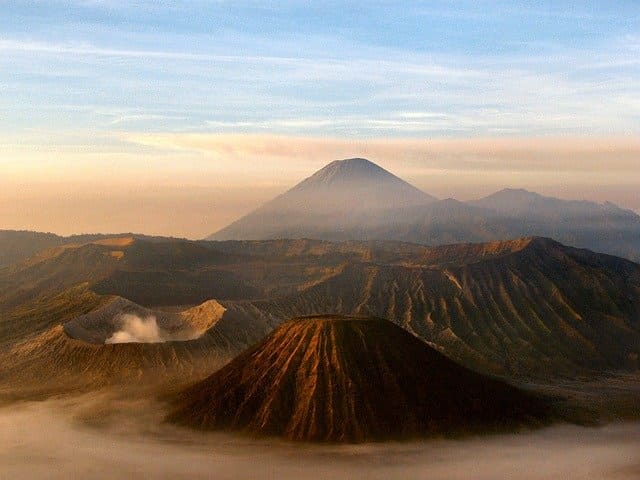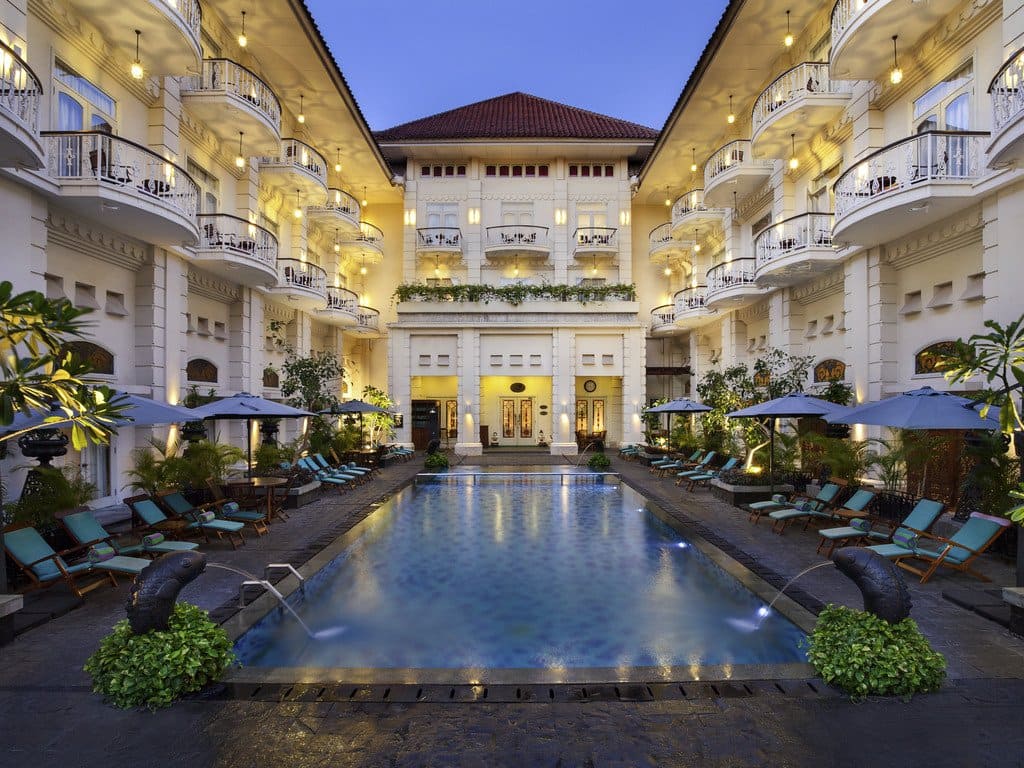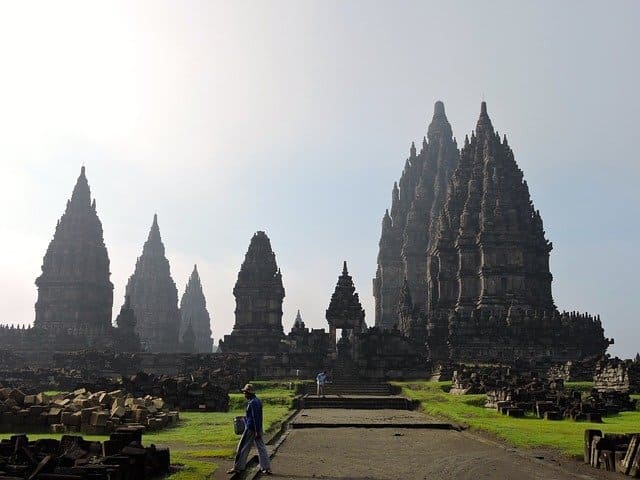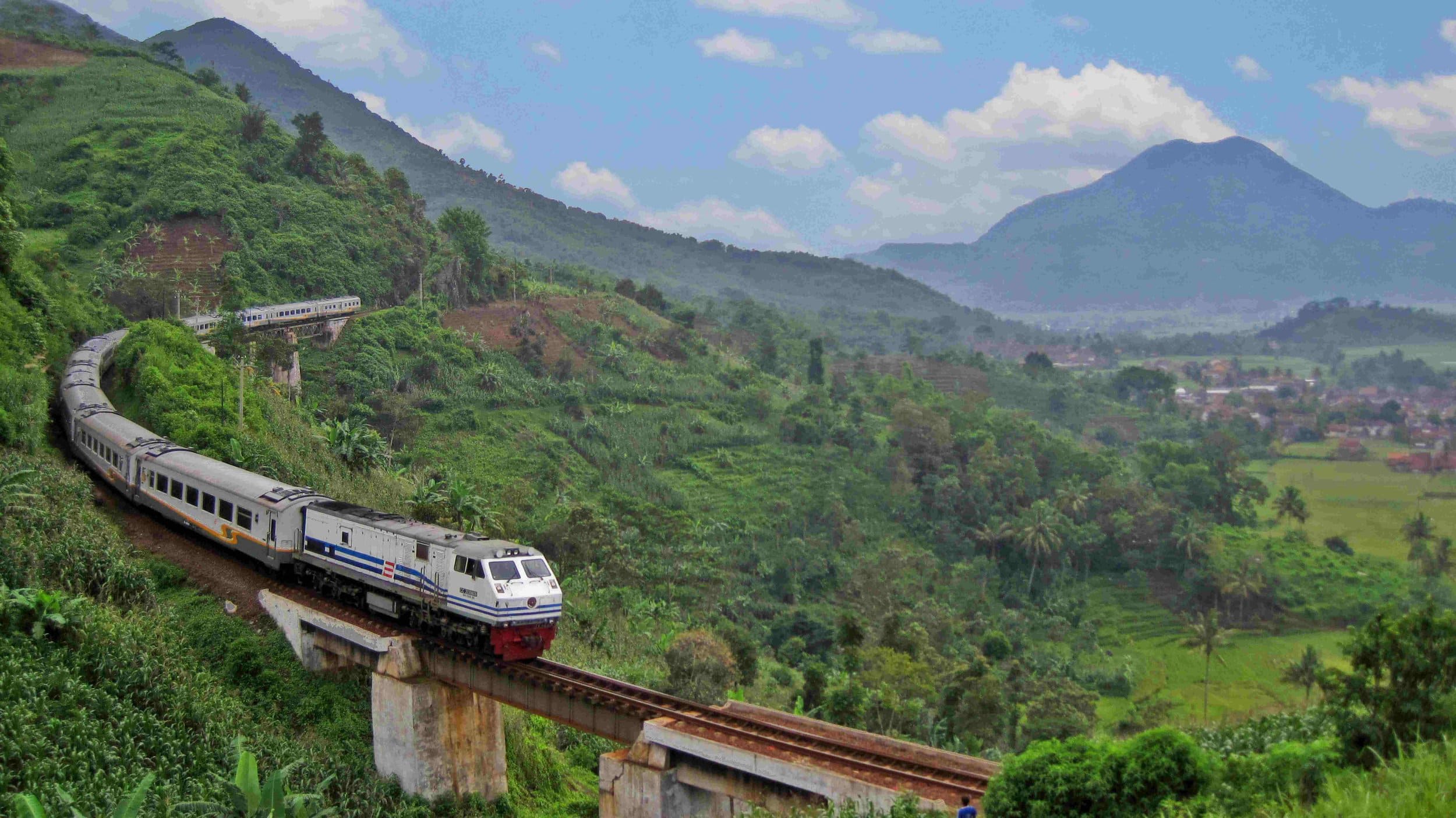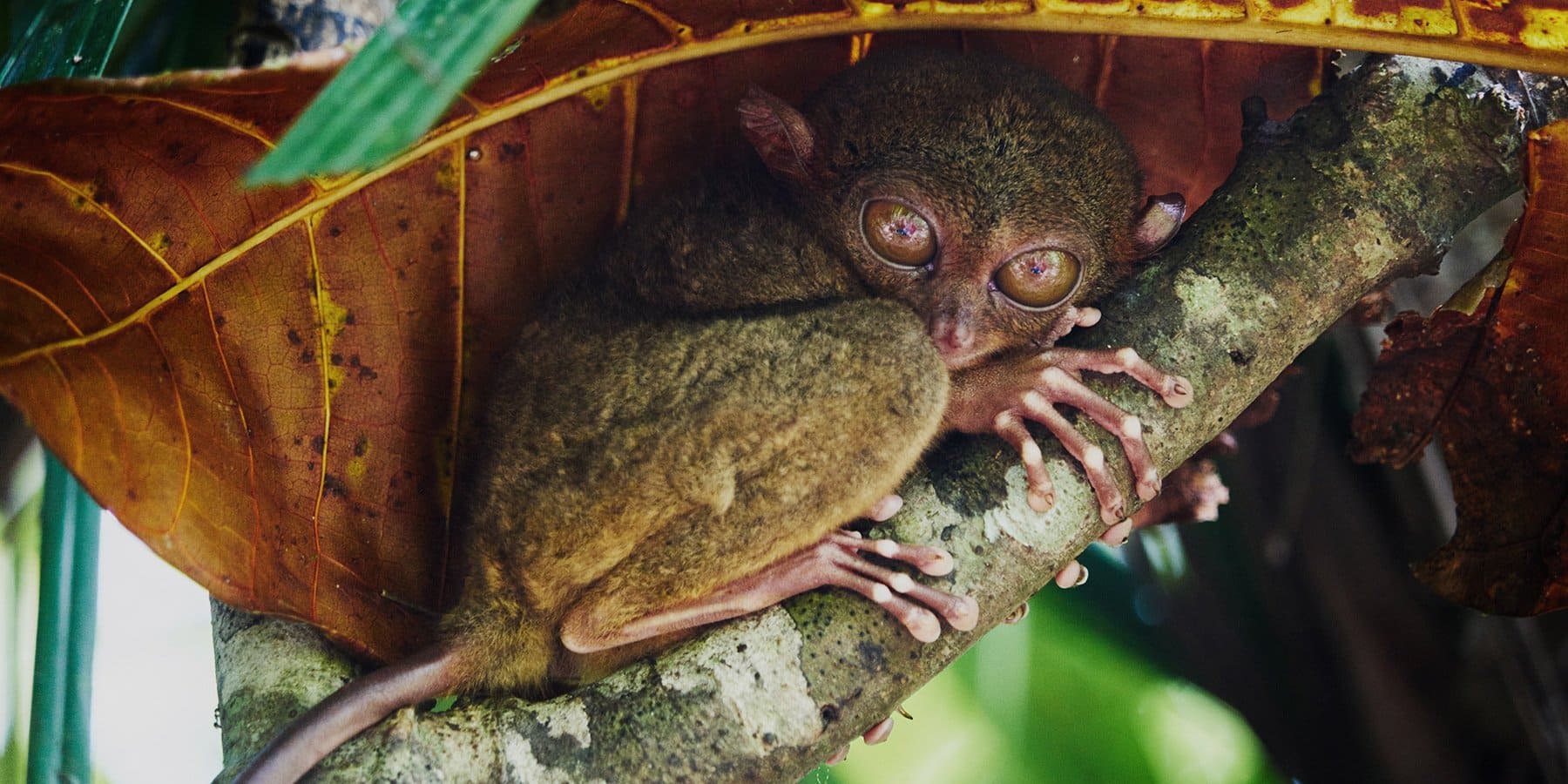Jakarta to Bali by Train
Small Group Tour
Java Jungles to Bali Bliss: An Island-Hopping Adventure
In an age of budget airlines and constant hurry, few international visitors are aware of Indonesia’s superbly scenic train journeys, including an excellent system that links the main cities on the island of Java.
Escorted by local guides, this immersive tour is your chance to explore the rich cultural and natural diversity of Java—one of the world’s most densely populated islands and home to over 140 million people. While the itinerary is crafted for the adventure traveller, you’ll stay in some of Indonesia’s most elegant heritage hotels, such as the luxurious Hermitage in Jakarta and the historic Phoenix Hotel in Yogyakarta-perfect choices for those seeking romantic getaways by rail or unique cultural retreats.
The journey begins in Jakarta, a sprawling megalopolis with deep historical roots. From here, travel east by first-class train to Yogyakarta, Indonesia’s cultural heart. This rail journey offers sweeping views of viaducts, lush hills, and terraced rice paddies nestled in jungle-clad valleys-ideal for fans of scenic train holidays. In Yogya, you’ll visit the breathtaking Prambanan temple complex, a UNESCO World Heritage Site and one of Southeast Asia’s most impressive Hindu landmarks-an essential stop for history lovers.
Continuing eastward, we reach Malang, a colonial-era city developed by the Dutch as a cool highland retreat. The next day features an early excursion to Mount Bromo. If weather permits, you’ll witness a stunning sunrise over the mist-filled volcanic landscape-an unforgettable highlight for those seeking hidden gems in Asia.
The adventure concludes with a short ferry crossing to Bali, where you’ll spend two serene nights in Pemuteran, a tranquil beachside village on the island’s lesser-known north coast—perfect for travellers who appreciate less touristy destinations and authentic cultural experiences.
This one-of-a-kind trip offers a chance to journey flight-free across Java and into Bali while staying in luxurious hotels and uncovering the historical and natural beauty of Indonesia. It’s the ideal adventure for anyone looking to unplug, recharge, and explore Asia in comfort and style.
Map + Tour Itinerary
Explore the itinerary in detail to get a sense of where you’ll be on each day of the adventure.
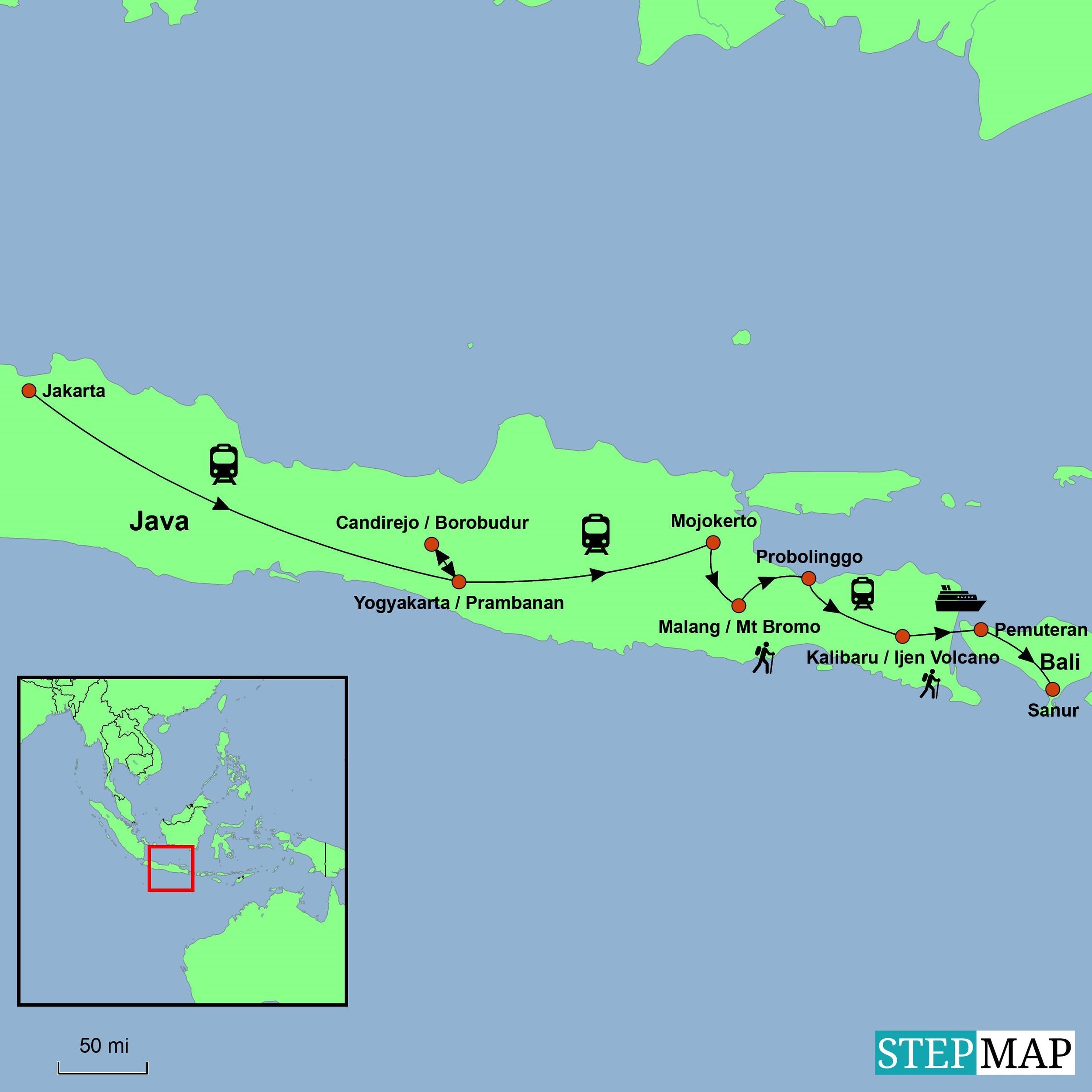
On arrival in the Indonesian capital, you will be met and transferred to your hotel. Overnight at The Hermitage Hotel or similar.
The Hermitage, Jakarta
A fabulous hotel which only opened in 2016, with great staff, great food, and an excellent rooftop pool and bar. The front building has been converted from a lovely Dutch colonial PTT (Post, Telephone & Telegraph) office built in 1943 with a new 9-floor building behind it containing the rooms and rooftop pool. The art deco design has been carried through the hotel with acres of white marble, this place is utter luxury and offers an indulgent start to any tour.
Meet your knowledgeable guide for an in-depth journey into Jakarta’s history and evolution. Enjoy a private transfer into the heart of the city to learn of its fascinating seafaring roots, discovering the old town of Batavia along the way. Boasting many historical buildings of the old Dutch trading company known as VOC, today’s Batavia is still home to the remnants of the once rich and powerful trading organization. Colonial Dutch structures have been transformed into museums, cafes, and galleries. Your first visit will be the lively old harbour of Sunda Kelapa, which once housed a range of Buganese Phinisi Schooners responsible for transporting goods from across the archipelago. Thought to be operational since before the 13th-century, the harbour is a fascinating location that preserves the history of Jakarta. Continue on to Taman Fatahilla, the historical centre of old Batavia and now cultural hub and home to three significant museums. Impromptu art performances populate the town square, adding to the excitement and creative ambiance. Visit the city’s National Museum, home to one of the country’s most complete collections of bronzes and ceramics dating back to the Han, Tang, and Ming Dynasties. The tour continues with visits to the Wayang Museum, dedicated to the art of shadow puppetry, and the Museum of Fine Art and Ceramics, boasting an eclectic assortment of over 400 artworks. Today’s lunch is at the beautiful Cafe Batavia, offering colonial splendour, live music, and international cuisine. Overnight at The Hermitage or similar (BL)
After breakfast meet your guide for a transfer to Jakarta’s modern Gambir station. Board an express train for Yogyakarta. Travelling first class, enjoy the 6.5 hours journey in air-conditioned comfort as the train crosses sweeping viaducts, snakes through gentle hills and past rice paddies nestling in narrow valleys amongst the jungle. On your arrival at Yogyakarta, transfer to your hotel, a colonial gem. Overnight at the Phoenix Hotel or similar. (B)
Phoenix Hotel, Yogyakarta
The venerable Phoenix Hotel is the place to stay in Yogyakarta. A landmark since 1918, the main building was originally the home of a wealthy merchant which became the residence of the Chinese consul after World War 2 before being converted into a hotel. Boasting classic rooms with Javanese and European elements in intricate details, the hotel has bags of quirky character, friendly staff and is excellently located.
Yogyakarta
Yogyakarta is situated almost exactly halfway along the length of Java, in an area considered to be the heartland of the Javanese. It is home to some of the island’s oldest traditions and blessed with a rich, fertile soil – a result of volcanic ash. It is also the cultural capital of Java, with many cultural influences, including Hindu and Buddhist temples, Mosques, and Dutch colonial architecture that harks back to the days when the Netherlands held much of Java in its imperialist grip.
Today we will learn more about Indonesian history with a full-day city tour. Start with a visit to Sultan’s Palace, also known as the “Kraton of Yogyakarta”. A model of traditional Javanese palatial architecture, the palace was built in 1970 by Sri Sultan Hamengkubuwono, and is the reigning seat of the Sultan of Yogyakarta. Over 25,000 people live within the greater Kraton compound named Tamansari, which features its own market, shops, batik, and silver cottage industries, schools, and mosques. Here we will tour the Taman Sari Water Palace, an 18th-century royal garden. Legend has it the Sultan would throw a rose from a tower above the pool, and the Princess who caught it would be his wife. Next, we visit the historic neighbourhood of Kotagede, famed as the hub of Yogyakarta’s silver industry since the 1930’s. Observe a busy silver workshop to further appreciate this suburb, formerly the first capital of the Mataram Kingdom established in the 16th century. Lunch will be served at local restaurants.
Later we visit one of the country’s must-see destinations, the UNESCO World Heritage site of Prambanan, where we explore the ancient Hindu temples in the UNESCO World Heritage site of Prambanan. Built in the 9th century, this collection of sharp, jagged temples features three main inner shrines dedicated to the Hindu trinity of Gods: Brahma, Vishnu, and Shiva. Our guide will explain the history and symbolism of the temples while walking around. Transfer back to our hotel in Yogyakarta. Overnight at the Phoenix Hotel or similar. (BL)
Meet your guide and driver to set out for the traditional Javanese village of Candirejo. Here, residents are supported by a local organisation and have implemented a sustainable tourism project to share the Javanese way of life. Travelling in a traditional horse cart known as an “andong/dokar”, we explore this peaceful village and countryside, journeying through small rural lanes and plantations. Your knowledgeable guide will introduce you to Javanese daily life, allowing you to take a closer look at the different village activities such as harvesting and drying chili, making cassava crackers and crafting products from bamboo. Next, we visit a local house where the community performs traditional percussive gamelan music, having a chance to master this amazing art form yourself. During the tour we will enjoy a delicious Javanese meal at a pavilion known as a Pendopo Rumah. Our journey continues to the awe-inspiring Borobudur Temple, a UNESCO World Heritage Site. This 8th-century artistic and architectural marvel takes the shape of a sacred mandala when seen from above. A member of the Borobudur Conservation Association will give us an exclusive introduction to the intricate details of the incredible structure’s 2,600 relief panels and more than 500 Buddha statues. Continue our tour with a visit to the Pawon Temple built with volcanic stones in a blend of Javanese, Hindu and Indian art, and the exquisite 9th-century Mendut Buddhist Temple and Monastery. All of the temples which we visit today were built in one straight line in order for the devout to ease their pilgrimage during the full moon. Overnight at the Phoenix Hotel or similar. (BL)
As our train leaves at just before 7am, we will have an early breakfast, followed by a transfer to Yogyakarta Railway Station. Board the train for a scenic 4 hour ride to Mojokerto in East Java from where will continue by road, with a stop along the way for lunch (not included and payable locally), to the colonial city of Malang. Overnight at the Hotel Tugu Malang or similar. (L)
Malang
Malang is another example of a colonial city built by the Dutch to escape the heat of the coastal plains. It lies on a plateau surrounded by a range of volcanoes. As is the case with other Indonesian cities, Malang has its share of congestion and pollution, but the colonial ambiance has not completely disappeared, especially along Ijen Street and in Tugu Square. Toko Oen, a café where plantation owners used to socialize in colonial times, has barely changed and is the place to sip tea or coffee and partake in traditional Dutch snacks such as kroketten (croquettes) or bitterballen (round deep-fried pastries).
We begin our day with a tour of Malang with its interesting mix of traditional Javanese temples and Dutch Colonial architecture. We visit take in all the major sights such as Jalan Ijen and Tugu Square with its handsome colonial City Hall. Time permitting, we will Rainbow Village, a slum area in the Jodipan neighbourhood that has been transformed. A few years ago, living conditions in the village were so bad that the government planned to relocate all its residents. However, a group of students from the University of Malang came up with the idea to give the whole area a fresh, multi-colored coat of paint in the hope that it would attract the attention of tourists. In June 2016, air force troops painted the entire village and directly after, tourists started to visit the colorful rainbow village, providing residents with much-needed attention and income. Later continue to Tumpak Sewu Waterfall. The waterfall is overshadowed by Semeru, an active volcano and the highest mountain in Java. Continue to Bromo arriving mid to late afternoon. Overnight at Jiwa Jawa Bromo or similar. (B)
In order to see the spectacular sunrise from the crater rim of Mount Bromo, we will have an early hours (around 3am) start to our day. Travelling by jeep we reach the starting point of the walk to the crater. From here you have two options; to trek which will take around 4 hours (depending on physical condition) or for an additional cost to be paid locally, you can ride a pony. After our visit to the mountain, we will continue by road for about 2 hours to Probolinggo where we will join a local train (one class only) to Kalibaru, a good base from which to visit the local plantations. Enjoy a scenic 2 hour journey and an opportunity to meet the friendly local people. Overnight at the Margo Utomo Hillview Cottages or similar. (B)
Kalibaru is known locally for producing excellent nutmeg, cinnamon, pepper, cocoa, coffee, and coconuts. Visting the plantations we learn how each crop is grown and harvested, along with a demonstration of how palm sugar is processed, a staple ingredient in this part of the world. Later we continue about 2 hours by road to Ijen, where will stay before visiting the active crater of Kawah Ijen volcano the next morning. Overnight at Ijen Resort or similar. (BD)
Very early morning (around 3am) we will drive to the meeting point where we will meet our guide for a trekking excursion to the crater of Kawah Ijen volcano. Depending on your physical fitness the trek is likely to take about 2 to 2.5 hours to ascent) and around 1.5 to 2 hours to descent. The volcano is well known for its
stunning blue-acid lake with massive amounts of sulfur exuding from the mountain – one of the most acidic bodies of water on the planet. Here you can see the local sulfur miners walking down into the sulfur clouds to collect hardened sulfur and then trek back out – often carrying nearly twice their body weight. The scenes inside this active volcano are breathtaking – something you will be unlikely to experience again. Enjoy what we hope will be a spectacular sunrise before returning to the hotel for refreshment and breakfast. Later drive to Ketapang harbour, on the eastern tip of Java, where will take the short ferry crossing to Gili Manuk harbour, on Bali. At this point we will say goodbye to our guide who return to Java, whilst we continue with a Balinese guide to Pemuteran. Arriving in the late afternoon, we will enjoy a 2 night stay away from the crowds on Bali’s less visited north coast. Overnight at Plataran Menjangan or similar. (B)
Important Information
Please note that all international visitors to Bali must pay a tourism levy, a one-off fee of 150,000 Rupiah (around US$10) to enter the island. This has to be done in advance via the Love Bali website.
Enjoy a free day at the resort. Simply relax after your overland adventure from Jakarta or through the hotel you can organise a local excursion or walk. Overnight at Plataran Menjangan or similar. (B)
After breakfast the final leg of our journey will take us to Sanur on Bali’s southeastern coast, and conveniently located for the international airport. Along the way we will make some interesting stops, the first of which will be at the Buddhist monastery known as Brahma Ashrama Vihara, which was founded by one of Bali’s
few Buddhist monks, in 1969. Then visit the Banjar Hot Spring. This hot spring is set amid the gorgeous jungle in a landscaped tropical garden offering pools and showers – be sure to have a change of clothes and towel at hand. Arrive in Sanur in the afternoon where we stay for our final night of the tour. Overnight at the Hyatt Regency Bali or similar. (B)
After check-out from your hotel (please note that check-out time is 12:00), meet your driver for a transfer to Denpasar Airport in time for check-in and your departure. (B)
| Destination | Tour Code | Start | End | Trip Status | Pricing Per person |
|
|---|---|---|---|---|---|---|
|
Indonesia - Jakarta to Bali by Train
|
JBT/300526 |
May 30, 2026
Saturday |
Jun 11, 2026
Thursday |
Full |
£2,745.00
Single Room Supplement: £895.00
|
Contact us |
|
Indonesia - Jakarta to Bali by Train
|
JBT/260926 |
Sep 26, 2026
Saturday |
Oct 08, 2026
Thursday |
Guaranteed |
£2,745.00
Single Room Supplement: £895.00
|
Contact us |
|
Indonesia - Jakarta to Bali by Train
|
JBT/290527 |
May 29, 2027
Saturday |
Jun 10, 2027
Thursday |
Guaranteed |
£2,745.00
Single Room Supplement: £895.00
|
Contact us |
|
Indonesia - Jakarta to Bali by Train
|
JBT/250927 |
Sep 25, 2027
Saturday |
Oct 07, 2027
Thursday |
Guaranteed |
£2,745.00
Single Room Supplement: £895.00
|
Contact us |
Tour Inclusions
- Arrival and departure transfers
- Overland transport throughout with professional driver
- First class rail travel (or standard class where shown)
- All accommodation
- Services of English-speaking guide / tour leader
- Meals as listed
B – Breakfast
L – Lunch
D – Dinner - Entrance fees for sites listed as part of the itinerary
Feedback from our Travellers
See what other adventurers have to say about our small group experiences.
Fill the form below to receive a tour information pack including a detailed day by day itinerary.
Essential Info
Before booking your tour, please familiarise yourself with the country specific information provided by the UK’s Foreign, Commonwealth and Development Office (FCDO) – www.gov.uk/foreign-travel-advice. This includes important information such as latest immigration requirements, and details of any travel advisories.
We constantly monitor the advice posted by the FCDO. In particular we will always advise clients of any travel warnings. At present there are no warnings against travel to the parts of Indonesia that we visit on this tour. Please feel free to contact us should you have any specific concerns or would like to know in detail what measures are being taken to ensure visits remain trouble free and without incident.
It should be noted that this information applies to British citizens. Other nationals are asked to check the current position of their respective government.
At the time of writing British, US and Australian nationals require a visa for a tourist visit to Indonesia. For further details please visit the applicable website shown below.
British Nationals – www.gov.uk/foreign-travel-advice
US Nationals – travel.state.gov/content/travel/en/international-travel.html
Australian Nationals – www.smartraveller.gov.au
Other nationals should check the latest requirements with the authorities in their home country, or with the destination’s nearest embassy or consulate.
Should you require any documentation to support a visa application, such as a letter of invitation, upon request this will be provided by Undiscovered Destinations after receipt of your balance payment.
As it is the travellers’ responsibility to ensure that they meet all entry requirements it is essential that you check the rules and any other conditions at the time of booking and again when making your balance payment. In addition, we would strongly advise that you make a final check around two weeks before your arrival. This is important as requirements can change at short notice. Undiscovered Destinations, when possible, will provide guidance about entry rules, but in the first instance please contact the relevant authorities, including the applicable embassy or consulate for assistance.
It is your responsibility to ensure that you are in possession of a full passport, valid for at least six months after the date of return to your country.
We strongly advise that your passport contains a minimum of two blank pages, as this may be a requirement of the local immigration authorities. In addition, certain countries will stipulate that the two blank pages are opposite each other. If you are unable to meet these requirements, you may be refused boarding by your airline or denied entry by the immigration authorities.
For specific information about the requirements for your destination please check with the country’s embassy or consulate. Alternatively, UK citizens can visit www.gov.uk/foreign-travel-advice.
As with travel to most parts of Asia, we strongly recommend that you contact your doctor’s surgery or a specialist travel clinic for up-to-date information, advice, and the necessary vaccinations. For a visit of less than one month, almost certainly you will be advised to have immunisations against the following: Diphtheria and Tetanus, Hepatitis A, Typhoid, Meningitis. The use of a DEET-containing insect repellent is highly recommended.
The legal status and regulation of some medicines prescribed or purchased in your home country can be different in other countries. If you are travelling with prescription or over-the-counter medicine, travellers from the UK can refer to the guidance provided by the National Travel Health Network & Centre and published on the Travel Health Pro website. For further information on the legal status of a specific medicine, you will need to contact the embassy, high commission or consulate of the country or territory that you are travelling to.
It is a condition of booking with Undiscovered Destinations that you have adequate valid travel insurance. It is your responsibility to arrange appropriate travel insurance and ensure you have read and understood the full terms and conditions of your travel insurance policy to ensure that you are covered for all activities you intend to undertake whilst on the tour, including all optional activities. Your Insurance Policy must fully cover you for medical expenses (including cover for Covid-19 conditions) and emergency repatriation to your home country and be valid for the entire duration of your holiday.
When travelling to our destinations, many of which are underdeveloped and untouristed by mainstream tourism, a good deal of patience and a sense of humour is an important attribute. This will help you to cope with problems such as ageing or poor infrastructure and when maintenance may not be as high as we would always like.
The choice of appropriate accommodation in some towns and cities (particularly the smaller places) can be limited, and standards of both service and maintenance can be less than polished. Guides and other service providers in some of our destinations do not always have the decades of collective practice and experience that their counterparts in more developed countries can draw upon. Although we will always try and resolve any issues as quickly as possible, on occasions there may be some shortcomings which no matter how hard we try will be unavoidable.
